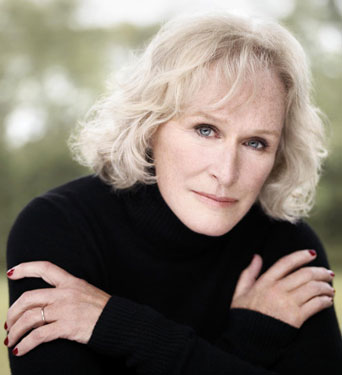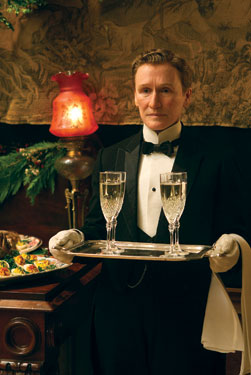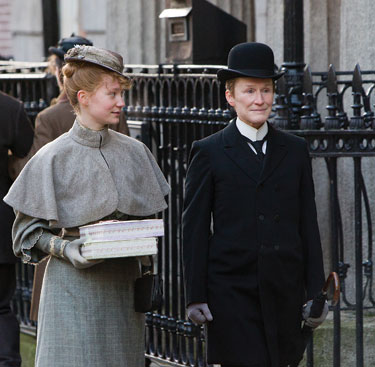METRO WEEKLY: What a remarkable motion picture. I was engaged and moved by it on every possible level. Let's talk a little bit about its journey from stage to screen.
GLENN CLOSE: I was still at beginning my career -- the only movie I'd done was The World According to Garp. It was 1982 and I was called in to audition for something called The Singular Life of Albert Nobbs, which was a stage adaptation of the George Moore short story "Albert Nobbs." I really, really was intrigued by the character, but I wasn't very good at auditioning, and in the middle of the audition I just said, ''You know what? I'm boring myself, so I must be boring you. I think I'm going to go home.'' [Laughs.]

Glenn Close
They called my agent and said it was the most interesting thing that had happened that day and they wanted me to come back. This was the Manhattan Theater Club. And I went to a coach that I'd heard of for the first time in order to learn some techniques for auditioning, and I went back and got the part. If I hadn't been given that second chance, we wouldn't be talking today. [After doing the play, it] was always on my list as something that I thought if handled in the correct way with the right people, it could be extraordinary on film.
We finally got it made. And even though I'm talking to you and we've had our New York premiere, it's still at that wonderful place in my consciousness of, ''Did we really do it? Wow, we did!'' [Laughs.]
MW: Stage is less forgiving than the screen. You really had to pull the character of Albert off convincingly on screen in a realistic manner. Talk about the extraordinary makeup job. What did they do to change your appearance?
CLOSE: That's the astounding thing, not much. I always knew I wanted this to be authentic in that the people in the story didn't look like idiots to think that these characters were men. And I always felt that I'd have the burden of my quite well-known face. Meanwhile, I've had, since 2002, a picture from National Geographic of a woman from Albania who is a sworn virgin. There's a culture in that country that, if they do not have a male heir, they designate a woman to live the life of a man. It's not about fake facial hair or anything other than just living the life of a man, and she's about the age that Albert would have been. And it's been my muse since 2002. Her hairline, her sideburns, her hands, her eyebrows, the expression on her face, it's rather incredible. And so that was the challenge, to have somebody who must have had things in her physiognomy that also would help her disappear.

Glenn Close as Albert Nobbs
So it ended up being very subtle things. Changing the tip of my nose. Making my ears bigger because I have very small ears. Plumping out the ears so that they stick out a little bit -- which I think gives Albert a kind of vulnerable thing. And then there's these things called ''dental plumpers,'' where they make a device that fits over your teeth and they add width to your gums. I just had a lower one, which just filled out the sides of my mouth a little bit. So that's all it was.
MW: Someone asked me if the film is about transgenderism in turn-of-the-century Ireland. And I said, ''No, it's not. It's actually a very interesting mix of gender identity and lesbianism.'' Interestingly, the film doesn't hit you over the head with a sledgehammer on any of its issues. Rather, it makes its points in very small, precise ways.
CLOSE: I agree with you. Sometimes if you remove a story from our times, people think, ''Oh, this is going to be a certain kind of movie,'' and then they're blindsided by what it's really about. There are still issues -- both Albert and Hubert are battered women. Helen would have become one. So it's about violence against women. It's about survival. It's about isolation. It's about how far people go to survive if they need to, if they need to hide something that they think will threaten their existence. All those issues are huge today. Unchanged.
For example, the scenes with Kathleen and Hubert, which I just love, because you see two people who just love each other, who have a successful relationship -- I think a lot of people forget that they're seeing a lesbian couple, as they should. You just feel the warmth and the safety of their home. And that image of their sitting room becomes Albert's dream, because it's about a connection that she's never had. But gender in some ways is irrelevant, because what Albert responds to and wants is that human connection. It doesn't matter what gender it is.
The thing that is fascinating about Albert is that she basically has made herself invisible for 30 years and she's just fine with that. The walls of her room aren't filled with pictures of where she'd like to go or who she'd like to be. She's safe in her job and she's making money and she's saving it, and that will keep her from the poorhouse. And that's as far as she'll go because it's a waste of energy to think any other way. She's surviving.
And so it's not until [her true gender is] revealed -- uncovered by Hubert -- that the beginnings of the connection with somebody who's made it work occurs. When she goes into Hubert's house, it's the first time she's been in a house. She'd never been in a home before. When Helen puts her head on Albert's shoulder and Albert puts her arms around Helen, that's the first time she's felt that kind of contact. You filter through those experiences as the first ever and they become quite powerful.
MW: I think the best moment in the film is when Albert and Hubert don dresses and stroll the beach. It's a profoundly exhilarating scene. It's the film's pinnacle sequence.

Albert Nobbs
CLOSE: I love that moment. That was the scene that I couldn't wait to act. Coming out of that door looking like two men in drag -- I hadn't ever done that before. [Laughs.]
MW: Psychologically, do you think Albert is ultimately a man or a woman?
CLOSE: I've only ever thought of Albert as a woman, but I think she's come to a point where she realizes that if she just gets back into a dress, what's she going to do? She wouldn't have a job. So she's more comfortable now in that other disguise than she is in clothes that would make her be able to walk freely down the street [as a woman]. So I think in some ways she has become a hybrid.
I think she's an unfinished person. When Hubert says, ''You can be whoever you are. Whatever you are now, is okay, whatever that is. If you need someone to share a life with you, you can find it." But I think at that point Hubert honestly doesn't understand how few tools Albert has in order to make that happen herself.
MW: In 1995, you played Margarethe Cammermeyer in the TV movie Serving in Silence. Have you spoken with Col. Cammermeyer since the 2011 repeal?
CLOSE: Yes. I was invited to go down and be with her in Washington. I just was working and I couldn't get away. But that was quite a moment when the president signed whatever he signed to rescind that.
MW: I'm a firm believer that all film, all television, all popular culture helps to pave the way ultimately for social change. So, in essence, your work personally contributed to the cause. Can you reflect on that for a moment?
CLOSE: Well, I believe it was an important contribution to make. I believe with every molecule in my being that people should be free to be who they are. Certainly in this country, but also everywhere. And I think one of the ways I can contribute positively is by what I choose to do.
That was one of the moments in my career when [a script] came to me and it was so well-written and obviously was something that was important, that I said, ''Well, I wonder what kind of flak I'll get? Will it affect my career, and blah, blah, blah.'' And whenever I start having thoughts like that I think, ''Okay, what's the alternative? Not do it?" I don't think so.
Albert Nobbs (Rated R, 113 minutes) is now playing in area theaters.
Continue reading:
Interview with Janet McTeer Introduction ...more